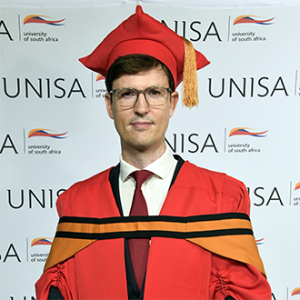College of Human Sciences
Passion for music and the arts leads to the highest academic honour
On 20 February 2025, the College of Human Sciences (CHS) gathered to listen to Prof Thomas Pooley as he delivered his inaugural lecture paper entitled "Symbols of Song: Theorising Melodic Complexity in South Africa’s Indigenous Music", with the respondent being Prof Daniel Avorgbedor of the Institute of African Studies and School of Performing Arts, University of Ghana.

Prof Thomas Pooley
Born and raised in KwaZulu-Natal, Pooley studied piano performance and musicology, graduating with a BA Music and a BA Honours summa cum laude from the University of KwaZulu-Natal, and going on to complete his Master of Arts and Doctor of Philosophy degrees in Musicology at the University of Pennsylvania.
Pooley was appointed to a lectureship in musicology at Unisa in 2013, progressing to the positions of senior lecturer and associate professor, and ultimately to a professorship in 2024. He served as head of Music Studies from 2014 to 2017, and later as Chair of the Department of Art and Music from 2021 to 2024. He is one of the pioneers responsible for developing the new Bachelor of Music degree offered by Unisa, and wrote many of the core modules in African music, music history and music psychology.
Both a pianist and composer, Pooley explained that music theory and analysis is an extension of these interests, and that as a scholar, he has been inspired to think about how mind, body and world come together in our perception and cognition of music. This meant studying a range of disciplines, including anthropology, linguistics, neuroscience and philosophy.
A recipient of the Benjamin Franklin Fellowship, Prof Pooley shared that since 2021 he has been working on a project to record, transcribe and analyse Zulu song melodies at sites across KwaZulu-Natal. His research is interdisciplinary, combining ethnographic and analytical work, and his inaugural paper focused on the theorisation of Zulu tone systems on the basis of high-definition field recordings made for the purpose of studying genres such as ingoma, isicathamiya and umaskandi.
His research further explores the way in which the melodic features of language and music coalesce in song. Pooley has developed a system of symbols for representing these features in notation, and his lecture also outlined what he calls a predictive processual model in cognitive music theory.
He stated that the inspiration for the title of his paper derived from the fact that symbols of song are needed in order to study the unique sounds of indigenous African music. In the past, scholars relied on Western music notation, and this resulted in distortions and anomalies. However, he has developed new visual representations to study the structures and grammar of African music. "Complexity" is a key term in this context, because of the multidimensional nature of pitch patterning in Zulu music.
Pooley further expressed a wish that the South African music and art industry will develop a healthy, distinctive and self-sustaining cultural ecosystem in which musicians are inspired, and will thrive and enjoy viable and lifelong career opportunities. In his words: "I would like to see African music achieve parity of esteem with art music and jazz in the South African curriculum. Also, I would like to inspire my students and colleagues to imagine new ways of thinking about music and mind, and to make an impact in less fortunate communities where access to education is limited."
Pooley concluded his lecture by expressing his gratitude to his family, colleagues and the university management, saying, "I owe my being and my success to my parents, Tony and Elsa, who inspired and supported me to pursue my dreams in music; to my mentors Gary Tomlinson and Eugene Narmour, who showed me the way; and to the love and support of my wife, Nicole, and our son, Julien. I am often reminded that 'dripping water hollows out stone, not through force, but through persistence'."
The Executive Dean of the College of Human Sciences, Prof Zethu Nkosi, congratulated the newly appointed Professor Pooley, saying, "Your hard work has led to this moment. This is the reward for your efforts, and may you continue to elevate others using the opportunities granted by this promotion."
* By Nnana Martina Jege, Communication and Marketing Specialist, College of Human Sciences
Publish date: 2025/03/14

 Unisa co-hosts G20 community outreach in the Eastern Cape
Unisa co-hosts G20 community outreach in the Eastern Cape
 Unisans gain membership of prestigious science academies
Unisans gain membership of prestigious science academies
 Advocating for disability transformation through servant leadership
Advocating for disability transformation through servant leadership
 Unisa Press continues to illuminate the publishing space
Unisa Press continues to illuminate the publishing space